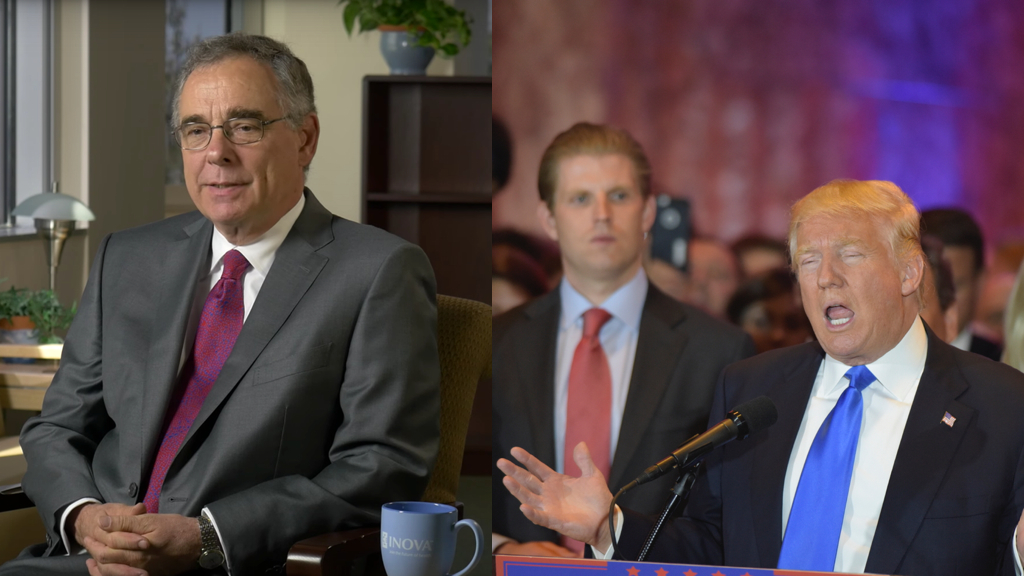During a recent campaign jaunt through her Northern Virginia district, Republican Representative Barbara Comstock was loath to discuss Donald Trump, her party’s presumptive presidential nominee. Instead, the Washington Post reported, Comstock wanted voters in Fairfax and Loudoun counties to hear about another Donald Trump.
The Donald Trump Comstock was talking about has almost nothing in common with Trump the candidate–well, except for one thing. Donald L. Trump is an accomplished oncologist and hospital executive who runs Inova’s Schar Cancer Institute in Fairfax. He’s also spent the last three decades dealing with questions from patients, casual acquaintances, and obnoxious reporters who want to know if he has any connection to Donald J. Trump.
“The last year has been in some ways a little different than the previous 25 or 30,” Donald L. Trump, 70, tells Washingtonian. “I’m getting a lot more calls about the Donald.”
The doctor—who goes by “Skip” with his friends and family, a nickname he’s had since growing up in Hudson, New York—says he first heard of his more famous namesake in the mid-1980s, when Donald J. Trump was becoming a force in New York City’s real-estate and social scenes, while he was an oncology professor at the University of Wisconsin. Since starting his medical career at the US Navy hospital in Philadelphia, Dr. Trump also spent time at Johns Hopkins (where he attended college and medical school), Duke University, and the University of Pittsburgh before landing at the Roswell Park Cancer Institute in Buffalo, New York, which he ran for 13 years before taking the Inova job in January 2015.
While Donald Trump the developer and politician was overextending his finances, bankrupting casinos, and slapping his name on any product pitched at him, Dr. Trump was researching treatments for genitourinary cancers, which affect the prostate, testes, bladder, and kidneys. In particular, much of his work has been devoted to developing Vitamin D-based treatments, with many of the advances coming in the past decade. Trump also specializes in speeding up the rate at which discoveries made in laboratory trials are brought to patients—known as translational medicine—a practice he says has led to big advances in cancer treatment.
“In the lab we were showing that vitamins made chemotherapy better,” Trump explains. “Now we have the availability of the whole panoply of ‘omics’—the study of the genes, the study of the bacteria and viruses that live in patients, and we now have technology to characterize genes, proteins, and all manner of things. We are treating cancers today which for a long time had no treatment.”
The two Trumps have crossed paths over the years. Their first exchange came in the ’80s, when Donald L. Trump wrote Donald J. Trump to inquire if there was any relation. To Donald L. Trump’s knowledge, there isn’t, although like the Trumps of Jamaica Estates, Dr. Trump traces his lineage back to Germany. “I suspect there is some commonality there, but none that can be traced,” he says
A more thorough exchange came in 2010, when Donald J. Trump called up Donald L. Trump, hoping to get a son of a friend into a clinical trial at Roswell Park. The trial was already underway, so Dr. Trump had to turn down the request. But Dr. Trump asked if Trump would participate in Roswell Park’s annual fundraiser in which participants shave their heads. Unsurprisingly, Donald J. Trump—whose hair is possibly a very expensive weave—refused, but he did make a “respectable” cash donation, Dr. Trump says.
Donald J. Trump then recorded a YouTube video for Roswell Park in which he effusively praised Dr. Trump. “Roswell Park is really, really lucky to have the other Donald Trump,” he says in the clip. “But the other Donald Trump is me. … Believe it or not, what you do in life is more important than what I do in life.”
The Donald J. Trump described by Dr. Trump bears almost no resemblance to the man whose campaign for president has been largely defined by its race-baiting, name-calling, consistent dishonesty, knack for violence at events, and undertones of white nationalism. In their private meetings, Dr. Trump recalls someone entirely different.
“All I can say is that he was quite reasonable and a good sport in that interaction and in addition to providing his name and visage, he also made a significant contribution,” Dr. Trump says. “I think it is an interesting dichotomy between my experience and his public campaign persona, but it is what it is.”
Despite the number of reporters who want to talk to him about sharing a name with a presidential candidate, Dr. Trump is reticent to talk politics. But it sounds as though this Donald Trump won’t be voting for the other Donald Trump in November.
“I think Mr. Trump’s politics and my politics are not particularly congruent,” Dr. Trump says. “But I don’t need to say anything more than that.”



















